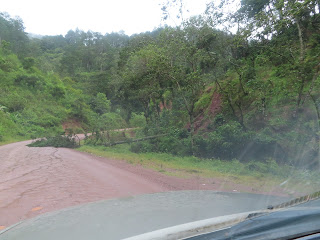It's Thanksgiving in the US, but I will give thanks here.
 |
| Honduras |
1992 was an extraordinary year in my life. It was a time of grace, a time of learning to say “gracias a Dios” – thanks be to God.
I had managed to persuade the parish of St. Thomas Aquinas Church and Catholic Student Center in Ames to provide sabbaticals to lay employees and I was the first to take advantage of the opportunity after eight and a half years of service in the parish.
But I took a different type of sabbatical. Instead of going off to study in a university. I spent almost seven months in El Salvador, serving for most of the time in the parish of Suchitoto. The parish, at that time, was served by a Salvadoran priest and had five US sisters working there, mostly in the countryside.
I arrived in time to celebrate a ceasefire and the peace accords that brought an end to a bloody civil war, in which many perished at the hands of a US-supported military. The war also precipitated the displacement of hundreds of thousands.
I ended up in Suchitoto thanks to my connections with the sisters – four Dubuque Franciscans and one New Jersey Sister of Charity, who had served the area during the war.
They ministered to the many communities that had returned to the countryside and lived in precarious situations, not least of all war and poverty.
 |
| Dubuque Franciscan Sisters Nancy, Pat, Kay (RIP), Carol |
The pastor and they sisters ended up sending me to a remote part of the parish. It was a four hour walk to get to the community where a family took me in. I stayed there usually for four or five days at a time, participating in the life of the village, visiting other communities – training catechists and other pastoral work.
I stayed with the Clavel family in their provisional housing, that Esteban, who had to flee the country to escape being killed, had fashioned out of the cattle stalls that once stood where he, his wife Rosa Elbia, and their children lived. I brought along a hammock for sleeping so that I wouldn’t displace anyone from their beds.
 |
| Esteban and Rosa Elbia |
Life was simple. A makeshift latrine, water brought by the family from a stream about thirty minutes away, bathing in the stream, eating tortillas and beans (often very salty) with the family. The housing was so provisional that during the rains water streamed in under my hammock.
But, in the midst of this, I experienced the grace of God.
Almost every morning in that simple home, I woke up in my hammock with the words, “Thanks be to God,” on my lips and in my heart. In that poverty, sharing it with good people, I experienced the giftedness of God. The only appropriate response was thanksgiving.
Today, Thanksgiving in the US, I find myself giving thanks.
I had plans to spend Thanksgiving with the Dubuque Franciscans (two of whom I know from Suchitoto) but the access to a major bridge between Santa Rosa de Copán was washed out and is provisionally repaired. So, I’ll have a different Thanksgiving.
This may help me recall how I have been blessed to serve in rural Honduras.
I don’t live nearly as poorly and simply as I did in Suchitoto 28 years ago. But we are in the middle of a pandemic that has restricted my ministry. Also, we have been buffeted by two hurricanes that have left villages in the parish isolated and many places without electricity for several days. Many villages also lack water because the water lines from the springs up the mountains have been broken.
But God is good.
And people have responded to the needs.
Local people have collected clothing and basic grains to share with those who have lost their homes or been displaced. Others, including some Hondurans who live in the US, have sent money to help buy basic food stuffs and cleaning supplies. Two friends are sending some money and our sister-parish, St. Thomas Aquinas in Ames, will be sending money for reconstruction efforts and may have a fundraiser for our needs.
Today, God willing, I'll be going with the pastor and others to take food, clothing, and more to a village that has been isolated since the first hurricane. It may be a grueling trip since we will probably have to take the highway to La Entrada and then the highway toward Copán Ruinas, since there is no access to that part of the parish from Dulce Nombre.
But I am grateful that we can help.
This will be a different Thanksgiving, perhaps getting to the essence of what this day should mean – recognizing the graciousness of God, remembering that all is gift, and responding in joyful love.
Thanks be to God.





































